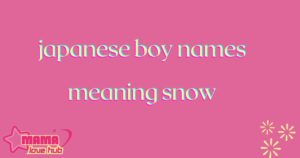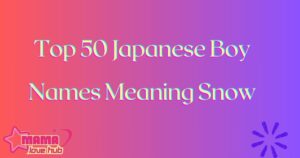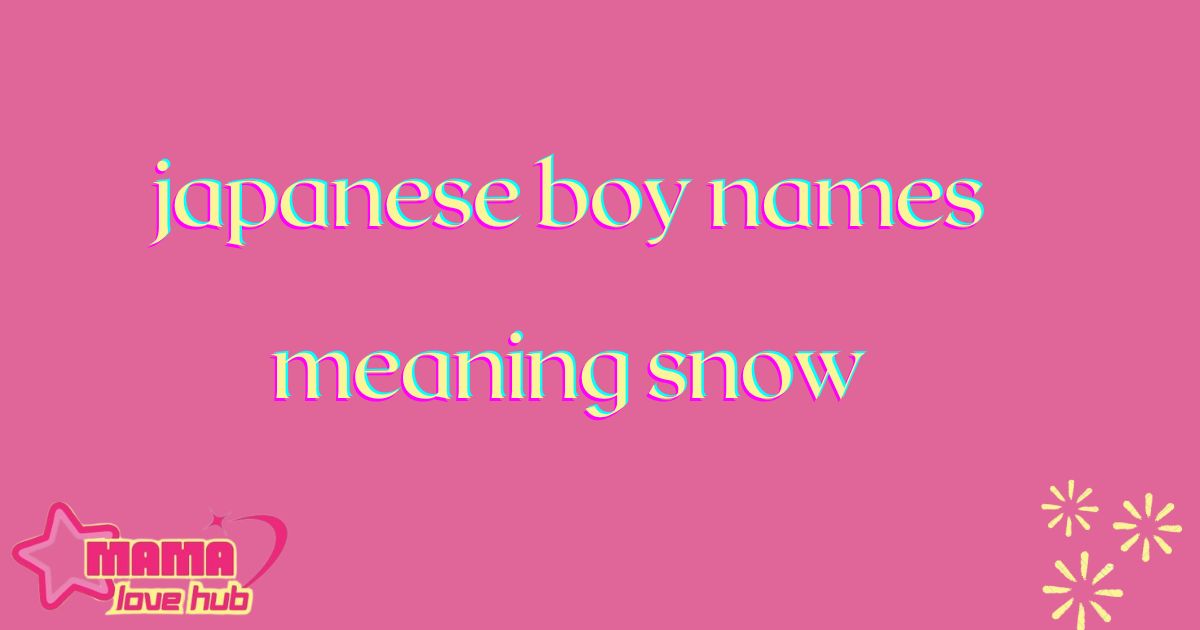Japanese Boy Names Meaning Snow: Before 50 Names with Meanings
In Japan, names hold a profound significance, often reflecting cultural values, aspirations, and even the natural world. One such category of names that carries deep meaning is those associated with nature, including names inspired by the serene beauty of snow. Japanese boy names meaning “snow” evoke images of purity, tranquility, and the quiet elegance of winter landscapes. Let’s delve into the world of Japanese boy names meaning snow and explore their meanings and cultural significance.

Importance of Names
Names in Japanese culture are not mere labels; they are considered an essential part of a person’s identity. Japanese names often reflect values, hopes for the future, and sometimes even the circumstances surrounding a child’s birth. Therefore, choosing a name is a decision taken with great care and consideration.
Japanese Boy Names
Japanese names are typically composed of kanji characters, each of which carries its own meaning. These characters can be combined in various ways to create names with rich symbolism and significance. Common themes in Japanese names include nature, virtues, and historical or cultural references.
Meaning of “Snow” in Japanese Culture
In Japanese culture, snow holds a special place as a symbol of purity, tranquility, and renewal. It is often associated with the beauty of winter landscapes, as well as with themes of stillness and reflection. Snow has inspired poets, artists, and storytellers for centuries, and its symbolism is deeply ingrained in Japanese traditions.

Top 50 Japanese Boy Names Meaning Snow
Yuki: Meaning “snow,” Yuki is a popular Japanese name that symbolizes purity and beauty.
Setsuna: This name means “moment of snow,” evoking the fleeting beauty of a snowfall.
Fuyuki: Combining the characters for “winter” and “snow,” Fuyuki signifies the arrival of winter and the beauty of snow-covered landscapes.
Natsuyuki: Meaning “summer snow,” this name reflects the rarity and unexpectedness of snowfall during the warmer months.
Haruki: Signifying “spring snow,” Haruki captures the delicate beauty of snowflakes against the backdrop of blooming flowers.
Yukito: Meaning “snow person,” Yukito emphasizes the connection between individuals and the snow-covered world.
Yukio: Signifying “snow boy,” Yukio highlights the purity and innocence associated with snow.
Yukito: This name means “snow baby” and conveys the preciousness and vulnerability of newborns.
Yukimasa: Combining “snow” and “true” or “correct,” Yukimasa suggests the purity and authenticity of snow.
Yukihiko: Meaning “child of snow,” Yukihiko emphasizes the close bond between individuals and the natural world.
Yukio: This name means “snowman” and evokes the playful and whimsical aspects of snow.
Yukitaka: Signifying “snow high,” Yukitaka highlights the majesty and grandeur of snow-capped mountains.
Yukimaru: Meaning “snow circle,” Yukimaru suggests the cyclical nature of seasons and the renewal brought by snow.
Yukinari: Combining “snow” and “thunder,” Yukinari conveys the power and unpredictability of winter storms.
Yukinobu: This name means “snow trust” and emphasizes the reliability and constancy associated with snow.
Yukinori: Signifying “snow command” or “snow rule,” Yukinori suggests the authority and dominance of winter landscapes.
Yukitomo: Meaning “snow friend,” Yukitomo highlights the companionship and solidarity found in snowy environments.
Yukihito: Combining “snow” and “person,” Yukihito emphasizes the individuality and uniqueness of each snowflake.
Yukisada: This name means “snow rice field” and underscores the importance of agriculture in snowy regions.
Yukiteru: Signifying “shining snow,” Yukiteru evokes the sparkling beauty of freshly fallen snow.
Yukiharu: Meaning “spring snow,” Yukiharu symbolizes the transition from winter to spring and the melting of snow.
Yukinaga: Combining “snow” and “eternal,” Yukinaga suggests the timeless and enduring nature of snow.
Yukishige: Signifying “snow luxuriant,” Yukishige highlights the abundance and richness of snowfall.
Yukinoshin: This name means “snow endurance” and conveys the resilience and strength needed to withstand harsh winters.
Yukio: Meaning “snow prince,” Yukio evokes images of royalty and nobility associated with snow.
Yukitake: Combining “snow” and “bamboo,” Yukitake suggests the flexibility and adaptability of snow.
Yukimori: Signifying “snow forest,” Yukimori emphasizes the beauty and tranquility of snowy woodlands.
Yukihisa: Meaning “long-lasting snow,” Yukihisa conveys the enduring presence of snow in the landscape.
Yukiharu: This name means “clear snow” and emphasizes the purity and clarity of freshly fallen snow.
Yukinori: Signifying “snow command” or “snow rule,” Yukinori suggests the authority and dominance of winter landscapes.
Yukinobu: Meaning “snow trust” and emphasizes the reliability and constancy associated with snow.
Yukiteru: Combining “snow” and “brightness,” Yukiteru evokes the radiant beauty of snow-covered landscapes.
Yukihiko: Signifying “child of snow,” Yukihiko highlights the innocence and purity associated with snow.
Yukinori: This name means “snow command” or “snow rule,” Yukinori suggests the authority and dominance of winter landscapes.
Yukito: Meaning “snow person,” Yukito emphasizes the connection between individuals and the snow-covered world.
Yukio: Combining “snow” and “man,” Yukio evokes the strength and resilience of snow.
Yukimasa: Signifying “snow true,” Yukimasa highlights the authenticity and purity of snow.
Yukiharu: Yeaning “spring snow,” Yukiharu symbolizes the transition from winter to spring and the melting of snow.
Yukinari: Combining “snow” and “thunder,” Yukinari conveys the power and unpredictability of winter storms.
Yukitaka: Signifying “snow high,” Yukitaka emphasizes the majesty and grandeur of snow-capped mountains.
Yukimaru: Meaning “snow circle,” Yukimaru suggests the cyclical nature of seasons and the renewal brought by snow.
Yukinobu: Combining “snow” and “trust,” Yukinobu emphasizes the reliability and constancy associated with snow.
Yukinori: Signifying “snow command” or “snow rule,” Yukinori suggests the authority and dominance of winter landscapes.
Yukitomo: Meaning “snow friend,” Yukitomo highlights the companionship and solidarity found in snowy environments.
Yukihito: Combining “snow” and “person,” Yukihito emphasizes the individuality and uniqueness of each snowflake.
Yukisada: Signifying “snow rice field,” Yukisada underscores the importance of agriculture in snowy regions.
Yukiteru: Meaning “shining snow,” Yukiteru evokes the sparkling beauty of freshly fallen snow.
Yukiharu: Combining “snow” and “spring,” Yukiharu symbolizes the transition from winter to spring and the melting of snow.
Yukinaga: Signifying “eternal snow,” Yukinaga suggests the timeless and enduring nature of snow.
Yukishige: Meaning “snow luxuriant,” Yukishige highlights the abundance and richness of snowfall.
Popular Japanese Names with Snow Meanings
Aside from the top 50 names listed above, several other Japanese names carry meanings related to snow. Names like Yukio, Toshihiro, and Makoto also evoke the imagery and symbolism of snow, albeit in different contexts. These names often reflect the parents’ desire to imbue their child with traits associated with snow, such as purity, resilience, and beauty.
Choosing a Name
When choosing a name for their child, parents may consider various factors, including the name’s meaning, sound, and cultural significance. Names with meanings related to snow may appeal to those who appreciate the beauty and symbolism of winter, or who wish to instill qualities associated with snow in their child.
Conclusion
Japanese boy names meaning snow offer a glimpse into the rich tapestry of Japanese culture and traditions. These names, with their serene beauty and profound meanings, reflect the deep connection between nature and human experience. Whether you’re seeking a name for your child or simply exploring the world of Japanese names, the names listed above provide a treasure trove of inspiration and symbolism.
Unique FAQs
Can I use a Japanese name for my non-Japanese child?
Absolutely! Many people around the world choose Japanese names for their children because of their beautiful meanings and unique sound.
Are Japanese names easy to pronounce for English speakers?
While some Japanese names may pose pronunciation challenges for English speakers, with practice, most names can be pronounced accurately.
What if I want a name that means something specific?
With a little research, you can find Japanese names with meanings related to almost any concept or quality you desire.
Do Japanese names always have meanings?
Yes, most Japanese names have meanings derived from the characters used to write them.
Can I combine Japanese names with names from other cultures?
Absolutely! Many people create hybrid names by combining elements from different cultures to reflect their diverse heritage or personal preferences.

